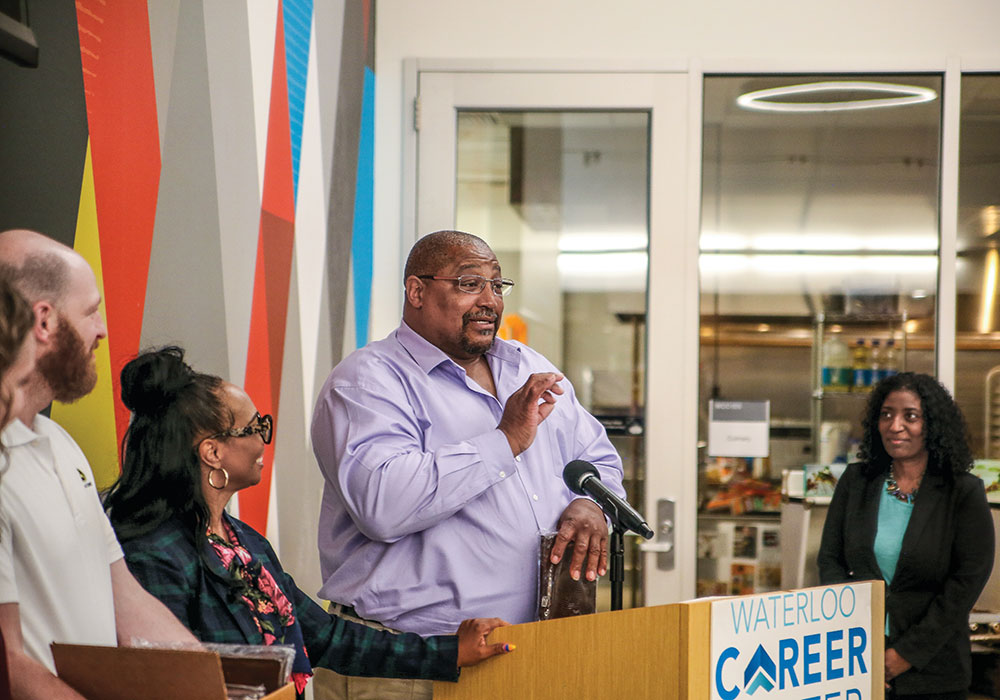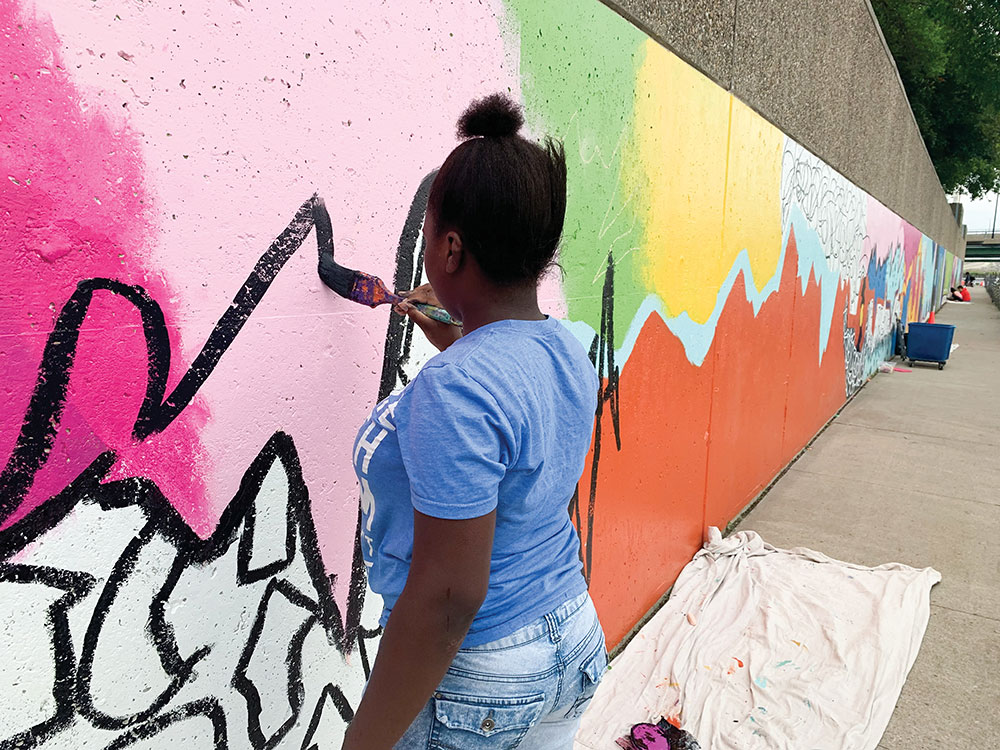Empowering Students and Entrepreneurs in Cedar Valley
Organizations work to accelerate small-business growth in Waterloo, Cedar Falls, Waverly and the surrounding communities.

In the Cedar Valley, it’s not unusual for a student to enter college in pursuit of a degree and leave with much more, such as the tools and skills needed to launch a successful business – thanks to organizations, such as the University of Northern Iowa John Pappajohn Entrepreneurial Center (JPEC). The JPEC is a valuable asset that significantly contributes to economic development in the region and serves as a catalyst for launching entrepreneurs in Cedar Valley, along with fostering innovation and business growth.
In This Article
A Smart Start for Businesses
Through its comprehensive entrepreneurship programs, workshops and mentorship opportunities, the JPEC equips students with the entrepreneurial mindset and practical tools needed to navigate the complexities of starting and growing a business.
“We have a physical incubation space that students can access, and they can actually launch their business out of a physical office space,” says Laurie Watje, JPEC director at UNI and an instructor of marketing and entrepreneurship. “We offer many levels of service, including business consultation. We can help them determine their potential market or help them navigate purchasing property. Maybe they have supply chain issues; we can help them with that. We’re here 12 months out of the year, so we can work with students even when classes aren’t in session.”
Watje says the skills students learn through the center’s programs can be applied to any career they choose and can help them achieve professional success.
“Many of these students that have gone through the program now have businesses here in the Cedar Valley.”
Laurie Watje, JPEC director at UNI
“A lot of the entrepreneurial skills make for a valuable employee. For one thing, these students are gaining confidence. They’re learning critical thinking skills; they’re evaluating market feasibility and determining what a customer needs and wants,” Watje says. “They’re embracing failure as a learning tool, and that makes them better leaders and better people. They also learn about work-life balance. It’s really an all-inclusive experience.”
Watje says the JPEC plays a vital role in not just the region, but the state’s economic development success.
“Many of these students that have gone through the program now have businesses here in the Cedar Valley. They have businesses in Des Moines and throughout the state of Iowa and throughout the Midwest. They’re launching these businesses, they’re employing people, and then coming back and financially supporting our program here as well,” she says.

Diversity Matters
Diversity in entrepreneurship remains a central mission for the JPEC. A partnership between the JPEC and the 24/7 Black Leadership Advancement Consortium’s (BLAC) Black Business Entrepreneurial Accelerator (BBEA) earned the Model Community Accelerator/ Incubator Award at the U.S. Association for Small Business and Entrepreneurship’s annual conference.
24/7 BLAC works to help Black professionals achieve wealth and financial empowerment through personal and professional development. The organization partnered with the JPEC to develop the curriculum for its 14-week business accelerator program.
“Diversity is really important because we know from research that the most diverse companies and communities are the most innovative. With the global economy that we’re competing in, having diversity is essential for communities that want to grow and thrive,” says Madelyn Ridgeway, executive director of 24/7 BLAC.
“Having diversity among our entrepreneurs creates new and different ideas and helps the business community grow,” she says. “Having businesses that serve all sectors of the community and all populations is important, and one of the ways we do our part is through the accelerator and helping Black entrepreneurs jump over some of the hurdles that Black business owners sometimes face.”
Marketia Moore, owner of Momma ‘Nem Soul Food and Catering in Waterloo, is a perfect example of the entrepreneurs the partnership between the JPEC and the BBEA was designed to help. Moore won the BBEA food takeover contest for food entrepreneurs at UNI as well as the John Pappajohn pitch contest, which came with a prize of $5,000 to help her purchase her first food trailer.
“We learned about tax etiquette, the legality of business, business/ personal credit scores, how to structure and form a business, how to get business loans, marketing, how to pitch a business, and we even learned about health department regulations,” Moore says. “We were offered opportunities to showcase our business at UNI. What was amazing is that we got to talk to so many people in our own community who have gone through the program, and they gave us incredible advice.”

1619 Freedom School
Engaging underserved communities to make the region stronger is the mission of two local organizations.
The 1619 Freedom School is an after-school program that employs a culturally responsive curriculum to improve literacy among fourth and fifth graders. Co-founded by veteran teacher Sheritta Stokes and Waterloo native Nikole Hannah-Jones, the Pulitzer Prize-winning journalist and author of the 1619 Project, the program hopes to bridge the academic gaps among Black students in Waterloo.
“The 1619 Freedom School is built on the understanding that for a people for whom it was once illegal to learn to read and write, education is a revolutionary act,” Hannah-Jones says. “Through this school, we will provide our students the type of education and support they have always deserved.”
The Youth Art Team, which works with young artists in underserved communities, helped students learn more about Waterloo history through the “Our Freedom Story” mural project. Some 150 young artists helped create the 3,000- square-foot mural along the Cedar River at the Waterloo Center for the Arts. Artists interviewed older residents about the Civil Rights Movement in Iowa for the mural.
“Learning about that history can be hard, but it’s important because even though some things are different now than they were during the movement, we have to make sure our generation doesn’t repeat it,” says Niara Myles, an artist who participated in the project.
Myles and fellow artist Za’Marion Epps say the mural project also taught them life skills.
“I have learned how to work with a team of people, with a group, sharing ideas and getting other peoples’ opinions,” Myles says.
“I am learning how to introduce myself properly and to be able to talk publicly about projects,” Epps says. “Art can build connections; it can connect you with people you wouldn’t usually connect with.”
A Kaleidoscope of Education
Gallagher Bluedorn Performing Arts Center in Cedar Falls calls itself Iowa’s largest classroom, and there are several reasons why. The biggest reason is that its Kaleidoscope program has welcomed nearly 800,000 pre-K to middle school students to see theatrical performances.
“Kaleidoscope is in its 23rd year, taking children’s books and bringing them to life on stage to engage students in several ways,” says Jennifer Onuigbo, community relations manager at the University of Northern Iowa.
Recent Kaleidoscope stage plays adapted from children’s books include “Giraffes Can’t Dance,” “The Lightning Thief,” and “The Boy Who Cried Wolf.”
“Everything we present aligns with Iowa educational curriculums and standards, which is how we have the slogan of Iowa’s largest classroom,” she says.
Gallagher Bluedorn also partners with the Kennedy Center and Waterloo Community Schools to bring art to students through a variety of teaching methods. In 2023, Gallagher Bluedorn introduced a week-long summer Science and Engineering in Technical Theater (SETT) Camp to teach 80 middle and high school students.
“There is no cost to the SETT students, thanks to various sponsors, and these students in grades 7-12 learn about audio engineering, lighting, set construction, costumes and much more,” Onuigbo says.
The Gallagher Bluedorn opened in 2000 and features three concert halls, and several teaching and rehearsal spaces. The center underwent a $15 million renovation in 2023.
Get to Know the Cedar Valley
Want to learn more about living and working in the Waterloo-Cedar Falls Metro Region of Iowa? Check out the latest edition of Livability Live the Valley.
